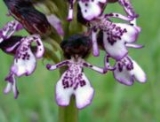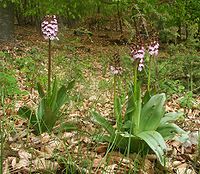
Lady orchid
Encyclopedia
The Lady Orchid is an herbaceous
plant belonging to the Genus Orchis
of the family Orchidaceae
.
 Orchis purpurea reaches on average 30–100 cm (11.8–39.4 ) of height. The leaves are broad and oblong-lanceolate, forming a rosette about the base of the plant and surrounding the flower spike. They are fleshy and bright green, and can be up to 15 cm long. The inflorescence
Orchis purpurea reaches on average 30–100 cm (11.8–39.4 ) of height. The leaves are broad and oblong-lanceolate, forming a rosette about the base of the plant and surrounding the flower spike. They are fleshy and bright green, and can be up to 15 cm long. The inflorescence
is densely covered with up to 50 flowers. The sepal
s and upper petal
s are violaceous or purple (hence the Latin name purpurea of the species). The flower's labellum
is pale pink or white, with a center spotted by clusters of violaceous or purple hairs. It is divided into three lobes; the outer two are small and narrow, and the inner is large, rounded, and heart-shaped. Flowering occurs in late April to June.
, northern Africa
, Turkey
, and the Caucasus
. Lady orchids usually grow in woodlands, in the oak forests, in slope and in the meadows, but occasionally occur on savanna. They prefer limestone
or chalk
soil, in shady or sunny places, at an altitude of 0–1350 m (0–4,429.1 ) above sea level.
or Monkey Orchid. The three species often hybridize, making them difficult to identify, although the shape of the labellum is distinct to each species.
, and slugs are among the greatest threats to this orchid. Human activity - picking flowers or uprooting plants - is also a concern.
Herbaceous
A herbaceous plant is a plant that has leaves and stems that die down at the end of the growing season to the soil level. They have no persistent woody stem above ground...
plant belonging to the Genus Orchis
Orchis
Orchis is a genus in the orchid family . This genus gets its name from the Ancient Greek ὄρχις orchis, meaning "testicle", from the appearance of the paired subterranean tuberoids....
of the family Orchidaceae
Orchidaceae
The Orchidaceae, commonly referred to as the orchid family, is a morphologically diverse and widespread family of monocots in the order Asparagales. Along with the Asteraceae, it is one of the two largest families of flowering plants, with between 21,950 and 26,049 currently accepted species,...
.
Description

Inflorescence
An inflorescence is a group or cluster of flowers arranged on a stem that is composed of a main branch or a complicated arrangement of branches. Strictly, it is the part of the shoot of seed plants where flowers are formed and which is accordingly modified...
is densely covered with up to 50 flowers. The sepal
Sepal
A sepal is a part of the flower of angiosperms . Collectively the sepals form the calyx, which is the outermost whorl of parts that form a flower. Usually green, sepals have the typical function of protecting the petals when the flower is in bud...
s and upper petal
Petal
Petals are modified leaves that surround the reproductive parts of flowers. They often are brightly colored or unusually shaped to attract pollinators. Together, all of the petals of a flower are called a corolla. Petals are usually accompanied by another set of special leaves called sepals lying...
s are violaceous or purple (hence the Latin name purpurea of the species). The flower's labellum
Labellum
Labellum is the Latin diminutive of labium, meaning lip. These are anatomical terms used descriptively in biology, for example in Entomology and botany.-Botany:...
is pale pink or white, with a center spotted by clusters of violaceous or purple hairs. It is divided into three lobes; the outer two are small and narrow, and the inner is large, rounded, and heart-shaped. Flowering occurs in late April to June.
Range and habitat
This orchid can be found in most parts of EuropeEurope
Europe is, by convention, one of the world's seven continents. Comprising the westernmost peninsula of Eurasia, Europe is generally 'divided' from Asia to its east by the watershed divides of the Ural and Caucasus Mountains, the Ural River, the Caspian and Black Seas, and the waterways connecting...
, northern Africa
Africa
Africa is the world's second largest and second most populous continent, after Asia. At about 30.2 million km² including adjacent islands, it covers 6% of the Earth's total surface area and 20.4% of the total land area...
, Turkey
Turkey
Turkey , known officially as the Republic of Turkey , is a Eurasian country located in Western Asia and in East Thrace in Southeastern Europe...
, and the Caucasus
Caucasus
The Caucasus, also Caucas or Caucasia , is a geopolitical region at the border of Europe and Asia, and situated between the Black and the Caspian sea...
. Lady orchids usually grow in woodlands, in the oak forests, in slope and in the meadows, but occasionally occur on savanna. They prefer limestone
Limestone
Limestone is a sedimentary rock composed largely of the minerals calcite and aragonite, which are different crystal forms of calcium carbonate . Many limestones are composed from skeletal fragments of marine organisms such as coral or foraminifera....
or chalk
Chalk
Chalk is a soft, white, porous sedimentary rock, a form of limestone composed of the mineral calcite. Calcite is calcium carbonate or CaCO3. It forms under reasonably deep marine conditions from the gradual accumulation of minute calcite plates shed from micro-organisms called coccolithophores....
soil, in shady or sunny places, at an altitude of 0–1350 m (0–4,429.1 ) above sea level.
Gallery
Identification
The Lady Orchid may be mistaken for the Military OrchidMilitary Orchid
Orchis militaris, the Military Orchid, is a species of orchid native to Europe. It is the type species of the genus Orchis.-Description:...
or Monkey Orchid. The three species often hybridize, making them difficult to identify, although the shape of the labellum is distinct to each species.
Threats
Deer, especially the MuntjacMuntjac
Muntjac, also known as Barking Deer and Mastreani Deer, are small deer of the genus Muntiacus. Muntjac are the oldest known deer, appearing 15–35 million years ago, with remains found in Miocene deposits in France, Germany and Poland....
, and slugs are among the greatest threats to this orchid. Human activity - picking flowers or uprooting plants - is also a concern.
Synonyms
Orchis fuscata Pall. 1773 Orchis fusca Jacq. 1776 Orchis moravica Jacq. 1785 Orchis militaris Hornem. 1806 |
Strateuma grandis Salisb. 1812 Orchis maxima K.Koch 1846 Orchis caucasica Regel 1868 Orchis lokiana, H.Baumann 1982 |

